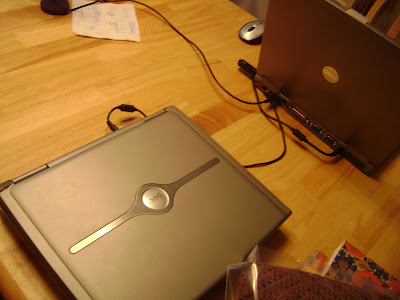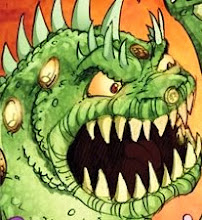I love books. It probably shows. To discuss further, and also comment on comments, here's some further thought.
First, yes, I agree that while books in the home will lead to smarter children, I suspect the books themselves aren't the cause of the smarter children. People who read/love books are generally more intelligent and more intellectually involved with their children from the get-go, so I think the books are really more of a by-product. A lovely by-product to be sure, but not the initial trigger for the smartness. Plus of course you can get into genetics and just what is inherited and how I'm convinced big-brained people breed more big-brained people and while that doesn't equal smart, it's a darn good starting place.
When I visit other homes and don't see books, it kind of weirds me out. What do they DO? I imagine them like some kind of android, walking in the door and shutting off until they go out the door to work or school again in the morning (let it be said I never denied having an over-active imagination). On the other hand, visiting people WITH books is like an automatic topic for chit-chat. Years ago we visited with some friends of the in-laws who'd kindly invited us all to dinner. After, we wandered into the living room for drinks and there on the coffee table was a book on the history of electricity; I'd never had any idea our one host was interested. The husbeast and I immediately were off on history and technology and we had a wonderful time with our host that wouldn't have happened without him leaving that book there, and without me spotting it.
Even the husbeast, who is dyslexic, has a foot-high stack of car mechanics magazines next to his easy chair.
I also think that if anything, it's more important to have a child SEE you reading, than to read to them. Because the one leads to the other. If I'm reading, as often as not the Goober will turn up with a book of her own, or if there are pictures in what I'm reading, will simply lean over my shoulder and ask questions and point and demand words. (She's the only child I've met who will announce "I don't know the word for that." and point.) Of course it all works out far better if there are books there for the child when they DO ask to be read to. But having the kid see parents reading as a normal thing to do with spare time is a huge behavioral trait they pick up on, very early. And thank goodness.
Oh, and that crate full of books in the photo yesterday? Those are only about half of her books. The good books, with paper pages (instead of 'board books' with cardboard pages) are in her bedroom on a real shelf. She's got more books than some adults; I feel very sorry for those adults.
Anyway. A couple weeks ago, a friend of mine was casting about for something good to read, and he asked several friends to make a list of 'thirty books you dig'. Fiction, non-fiction, it didn't matter. He did say that if it was a series of books, to just count it as one. I was one of his victims, and he gave me one other rule: no knitting books. So I put together a list and sent it off.
I thought it would make a fun voluntary meme sort of thing, to give all of us ideas what each other read, and good stuff we haven't seen yet. I won't say NO knitting books, but go light on them; we all know the good knitting books. Let's branch out into other stuff. Annotation isn't required; I put in comments because, let's be serious, I can't shut up. Here's my list.
THIRTY BOOKS I DIG:
-Kushiel series, Jaqueline Carey. Smut and philosophy all in one place. Gotta love 'em.
-
Cook Wise, Shriley O. Corriher. Cook book by a biochemist. She can tell you WHY things work the way they do. And how not to mess it up again.
-
5,000 years of Textiles, Smithsonian books. With pictures! Makes me want to build a draw loom on the back porch.
-
A Brief History of Nearly Everything, Bill Bryson. Yes, it's brief, and barely touches some topics, but he humanizes it and makes it entertaining. And explains geologic time and evolution in terms anyone can understand. Also
Made in America and
Mother Tongue. Or, really, anything he wrote.
A Walk in the Woods is one of the funniest non-fiction books I ever read.
-
Botany of Desire, by Michael Pollan. He follows four plants and discusses how mankind has forced them to evolve for our own purposes.
-
Lord of the Rings, J R R Tolkien. I know, I know. But it still kicks ass.
-World History, Dorling-Kindersley. It's newly published, one of those committee things. Kicks ass. I read it through cover to cover. Best part is the by-country history appendix in the back.
-Baking textbook, Cordon Bleu. With this you can bake THE WORLD.
-'In Death' series by J D Robb. Fluff, but entertaining fluff.
-
Cod, by Mike Kurlansky. And also
Salt. Pop history at its best, making things interesting that we had NO IDEA were so interesting.
-
The Phantom Toll Booth, Norton Juster. Kid's book, the first book I read to my kid though she was three months old at the time. It's about learning for fun, and obviously had a huge impact.
-Anything by Jenny Crusie. "Chick Lit", but good chick lit. Guaranteed feel-good reads. Sometimes a girl needs that. Not so much 'empowering' (I hate that shit) as 'fucking hilarious'.
-Ditto for the Stephanie Plum novels by Janet Evanovich.
-Amelia Peabody novels by Elizabeth Peters. These are about a family of Egyptologists. The books begin in the 1880s, and the last one was set in 1927. The author is an Egyptologist and puts in 'inside jokes' that you really have to know Egyptian history and archeology to get. Good stuff.
-
Guns, Germs, and Steel, Jared Diamond. Anthropology 101, but interesting.
-
Food in History, Reay Tannahill. Best food history book I know of, makes a serious effort to cover all cultures, and is readable by people without history degrees.
-
Botany for Gardeners, Brian Capon. I had a horticulture professor actually use this as a textbook, once. Best laypersons' discussion of botany I've ever seen.
-Children's books by Sandra Boynton. If I've gotta read the same damn book five times in a row, at least these are cute and funny and well-illustrated. I've got several memorized (One hippo, all alone, calls two hippos, on the phone).
Hippos Go Berserk and
But not the Hippopotomus are personal favorites.
-
Don't know much about the Bible, Kenneth C Davis. Goes through the Bible book by book, giving a history of where the text came from, what they were thinking when they wrote it, surrounding historical and cultural pressures, and contradictions within it and with other books.
-
Ancient Inventions, James and Thorpe. An honest look at what went on in our past, through texts, archaeological remains, etc. Contains info on the Baghdad Battery, etc.
-
The Story of Stupidity, James F Welles. You'll have trouble finding this one unless its been reprinted. It's from a small university press and I picked it up in a college book store. Anyway, it explains WHY people do stupid shit and finally really got me to understand how others' brains work.
-
A History of Art, Borders Press. Another conglomerate/committee type book. About four inches thick, but not bad for a general overview. It's fairly snooty and obnoxious, but you get that from art historians.
-
The Arts of China, Michael Sullivan. Know the art, know the culture. Though he does go on a bit more than necessary about the freaking ink drawings. I don't CARE how popular they are.
-
The Universal History of Numbers, Georges Ifrah. Just what it says. The guy should have an honorary PhD from SOMEWHERE for this book. Starts in Sumeria and branches out; there are chapters for each region and culture as needed.
-
Bright Earth, Phillip Ball. Another book by a chemist, this one about art, painting, dyeing, and color. All in layman's terms, and wonderfully interesting.
-Collins Atlas of Archeology. A series of articles by a bunch of specialists. Maps AND archeology. What's not to love?
-
The Battle for God, Karen Armstrong. The history of fundamentalism in the modern world, why it happens, and to whom.
-
Women's Work, Elizabeth Wayland Barber. Sure, some of her conclusions are debated, but still. It's the only really approachable work of it's kind, a history of textile production and the people (women) who did the work.
-Mad Scientist's series of books, by Bertrand R. Brinley. Old - from the sixties - and kind of dated, yet still hilariously good young adult fun. Really smart kids getting into trouble, essentially. These are waiting for the Goober. I read them too.
-
The Tao of Pooh, Benjamin Hoff. Also
The Te of Piglet. If you want Taoism explained in a way you'll understand, these are the books for you. Gentle, funny, peaceful, much like Taoism itself.
There you go. Anyone who would like to join in, feel free. Hit your shelves, see what you've got out, in progress, and share your favorites. I can't wait to see, and find more things to read.








































